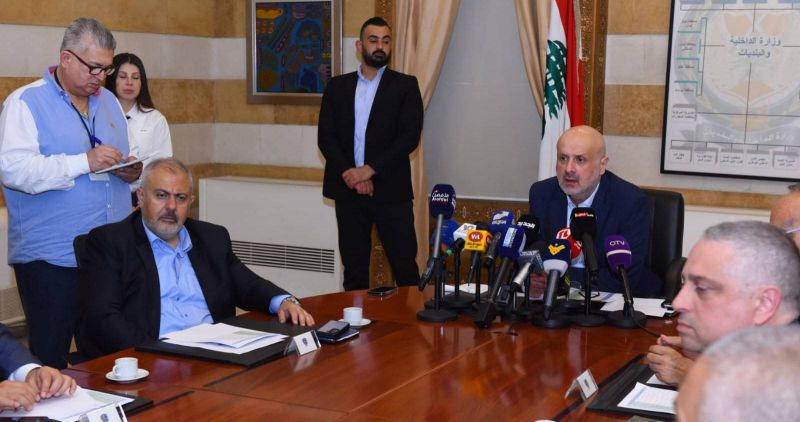
Caretaker Lebanese Interior Minister Bassam Mawlawi at a press conference in Beirut, April 24, 2024. (Credit: NNA)
The Syrian migrant issue in Lebanon was given a boost on Wednesday, with two high-level meetings: That of the caretaker Minister of the Interior, Bassam Mawlawi, with representatives of the security services, and that of the Chairman of the Parliamentary Foreign Affairs Committee, Fadi Alameh, with the Prime Minister, Najib Mikati.
At a press conference following a meeting to review the security situation in Beirut, Mawlawi said the meeting was aimed at putting in place "a clear security plan that reassures citizens." "The arrests made by the security services are on the increase, and all crimes will be solved," he assured. Mawlawi also stated that "the laws will be applied to everyone" and that "the management of the Syrian file is not part of a racist campaign." "The Ministry of the Interior issues circulars to municipalities to apply the law, and through these laws we regulate the security situation," he added.
He also revealed that "the General Directorate of General Security has received data enabling it to know the number of Syrian refugees." This data transfer was part of an agreement between the United Nations High Commissioner for Refugees (UNHCR) and Lebanon signed in August 2023. In October 2023, caretaker Lebanese Foreign Minister Abdallah Bou Habib stated that Lebanon "will no longer tolerate, after the end of the month," any delay by the UNHCR in handing over this data to the Lebanese authorities.
A week ago, Mawlawi had said that Syrians who do not have "security reasons" for being in Lebanon cannot stay there. Tensions between Syrians and Lebanese recently increased following the murder of Lebanese Forces (LF) executive Pascal Sleiman, for which Syrian nationals were arrested. In the days following the murder, Mawlawi said that "the presence of Syrians in Lebanon, as it exists today, is unacceptable." Another murder in Azzouniyeh, in the district of Aley, for which two Syrian nationals were also arrested, sharpened anger and increased tensions towards Syrians in Lebanon.
Also on Wednesday, LF leader Samir Geagea reacted on X to Britain's adoption of a law on the deportation of all illegal migrants. "To Prime Minister Najib Mikati, to Minister Bassam Mawlawi and to the Lebanese government: Great Britain, a state of law and institutions, a country of human rights, freedom and justice, has seen its House of Representatives (House of Commons) pass a law to deport any illegal immigrant. When will the prime minister and interior minister follow Britain's example and support the work of the security services to send illegal refugees back to Syria?" he asked. After months of wrangling, on Monday night the British Parliament approved the bill allowing the deportation of asylum seekers who have entered the UK illegally, which must now receive the Royal Seal – a formality – before coming into force.
MPs also get busy
The chairman of the parliamentary Foreign Affairs Committee, Fadi Alameh (close to Parliamentary Speaker Nabih Berry), stressed "the Lebanese state's determination to follow the Syrian refugee file, given its importance and its many repercussions on the situation in Lebanon," reported the state-run National News Agency (NNA). These comments were made at the end of a meeting at the Grand Serail between members of the parliamentary committee and the caretaker prime minister, Najib Mikati, which focused on the issue of "displaced persons," as Lebanon calls them. The discussion also touched on the 8th Brussels Conference on the future of Syria, to be held in the Belgian capital in the coming days. "We also discussed all the initiatives likely to speed up the return of Syrians to their country," said the MP.
With 1.5 million Syrian refugees in Lebanon, according to official figures, including some 950,000 registered with the United Nations High Commissioner for Refugees (UNHCR), Lebanese politicians of all stripes regularly call for their immediate repatriation. They claim that current conditions in Syria allow for such a return, while the UN and other human rights groups maintain the opposite.
"The meeting with Mikati reassured us," continued Alameh. "We discussed how to help displaced Syrians in their own country." The MP noted that "positions in Lebanon are unanimous on the issue" of refugees and that "all political parties support the government's position," as "the question of displaced Syrians weighs heavily on the country's demographics." Since 2019, Lebanon has been in the grip of an unprecedented political, social, financial and economic crisis, as well as the mass emigration of young people with no prospects for the future. Added to this is a rising crime rate, which much of the political class blames on the presence of Syrian refugees. "The official position is that Lebanon can no longer tolerate the presence of displaced persons. Thinking is now turning to an operational strategy to speed up their return," continued the MP.
Also on the agenda of the meeting with the head of government were "the war in south Lebanon" and "support for the forces of law and order, so that they can play their role on the Lebanese-Israeli border."
This article originally appeared in French in L'Orient-Le Jour.